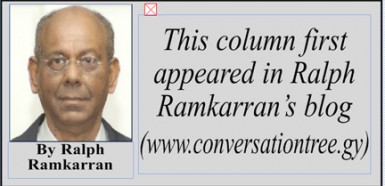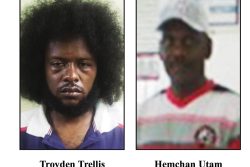A report appeared in the press last week of a meeting between the Prime Minister, Moses Nagamootoo, Minister of Governance Raphael Trotman and AFC executive and prominent attorney, Mr Nigel Hughes to discuss constitutional reform. Constitutional reform is one of the undertakings given by the APNU+AFC coalition in its 100-day programme. No doubt the government is looking to make an announcement on the issue before the end of the 100-day period.
On July 24 a symposium took place at Moray House on constitutional reform. The panelists were myself, Henry Jeffrey and Haslyn Parris. The proceedings were chaired by Miles Fitzpatrick. We were engaged in what might well be regarded as unfinished business. As leading member, Secretary and Chair, respectively, of the Constitutional Reform Commission, Miles Fitzpatrick, Haslyn Parris and I handed in our report to the Speaker of the National Assembly some fifteen years ago. The feeling at that time by some was that the process we had concluded did not resolve the most fundamental problems facing Guyana.
 The two main unresolved issues were the powers of the president and shared governance. In relation to the first, while there was some tinkering, the only way to substantially reduce the powers of the executive president was to limit his or her executive authority to certain portfolios, such as defence, foreign affairs and maybe others and with a cabinet under a prime minister responsible for the remainder – something administratively attempted under the Cummingsburg Accord, which has clearly failed. The other option would have been to convert the presidency to a ceremonial one with certain enhanced powers relating to the appointment of a government after elections and oversight over certain constitutional issues and appointments. The main political parties were not interested in either.
The two main unresolved issues were the powers of the president and shared governance. In relation to the first, while there was some tinkering, the only way to substantially reduce the powers of the executive president was to limit his or her executive authority to certain portfolios, such as defence, foreign affairs and maybe others and with a cabinet under a prime minister responsible for the remainder – something administratively attempted under the Cummingsburg Accord, which has clearly failed. The other option would have been to convert the presidency to a ceremonial one with certain enhanced powers relating to the appointment of a government after elections and oversight over certain constitutional issues and appointments. The main political parties were not interested in either.
The stark reality of the flaws in our constitution was revealed in the 2011 elections. It permitted a minority government to take and hold office for three years, achieving nothing, until elections were called. While the APNU+AFC coalition promised constitutional reform, and may well have been persuaded by the 2011 situation to make it a priority, there was little in the way of detail as to exactly what will be amended although some spokespersons, such as Nigel Hughes, provided some ideas. Much favourable sentiment still exists in favour of the enshrinement of shared governance or ‘winner does not take all.’ However, it remains to be seen whether the government will continue to favour these ideas, strongly supported by President Granger in the campaign, now that it is in office.
The first issue that needs to be considered is the mechanism for constitutional reform. In our recent history the first attempt after the Independence Constitution was in 1980. The mechanism was a Constituent Assem-bly established by a motion of the National Assembly and comprising mainly the National Assembly. The second effort was after the 1992 elections when the National Assembly established a Special Select Committee by motion. It did not complete its work by 1997 when the National Assembly was dissolved for the 1997 elections. The final process was in 1999-2000 by the Constitution Reform Commission, which was established by the Constitution Reform Commission Act. By agreement among the political parties, the Act provided that the Commission be comprised of political parties and civil society.
The Commission received some 4,000 submissions and travelled throughout Guyana taking evidence. Several overseas experts also gave evidence. The government will now have to decide whether to adopt one of these methods, or whether to establish a parliamentary Constitution Reform Committee which has the power to co-opt expert members. This is provided for by the Constitution and the Standing Orders. Alternatively, the government may decide to establish a different process altogether.
Guyana’s political culture suggests that the PPP will not participate in the constitutional reform process. Two principles will guide that decision. The first is whether there is anything in constitutional reform to benefit the PPP. The second is to try to obstruct anything the government wants to accomplish. The PPP is likely to be happy with the existing situation, which permits a party with only a plurality to take office. It may well speculate that with the collapse of the Cummingsburg Accord and the AFC’s loss or relinquishment of capacity to influence decisions or policy, it will lose its independent voice and distinct character. The PPP will calculate that the AFC will lose all or most of its separate support, thereby opening the possibility of the PPP returning to office with a plurality. There are other possible scenarios but the above is the most feasible. From the PPP’s perspective, therefore, constitution reform would not be in its interest.
The government must not be diverted from this major electoral undertaking by allowing the PPP to derail an opportunity, which may never return, to fix our political system. If a two-thirds majority would not be possible without PPP support, article 164 provides for a simple majority and a referendum for constitutional changes. Even if the PPP opposes proposals for constitutional reform, the electorate will be easily persuaded if the reforms are reasonable, not designed for partisan benefit and go some way towards structural reform of our governmental system that will encourage or necessitate inclusivity across the political spectrum.








